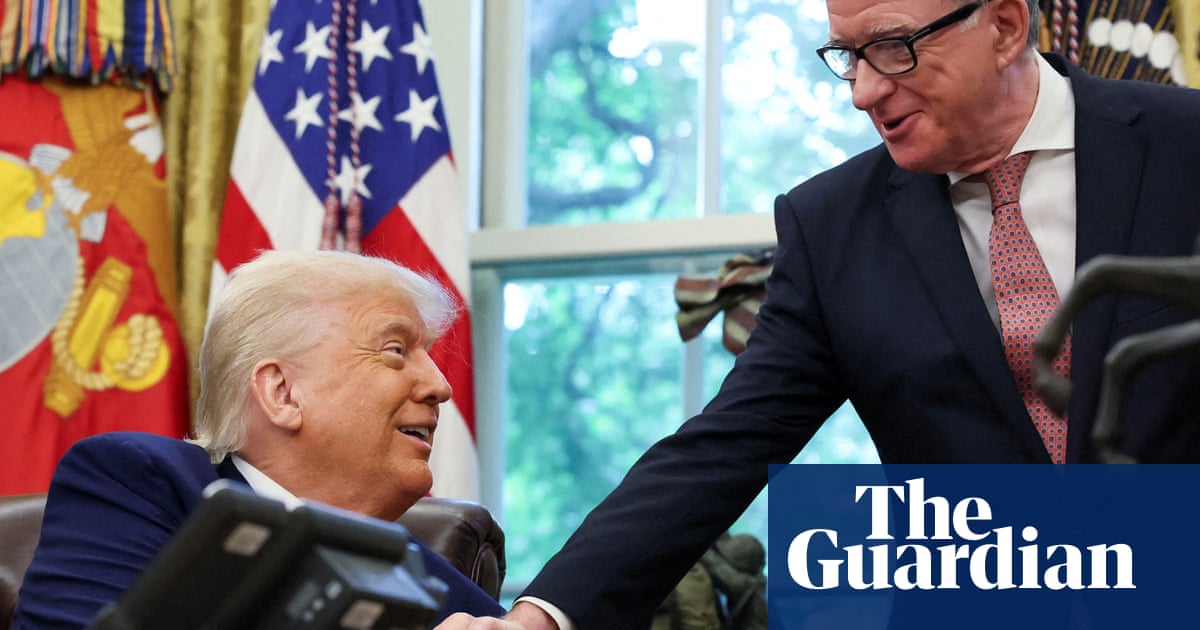Peter Mandelson, with his elegant suits, smooth patter and high-end lifestyle, has always had a dark secret: an interest in the minutiae of trade deals, left over from his period as EU trade commissioner, a period when he could bore for Europe on the virtues of the Mercosur trade deal. Alongside his networking skills, and political antennae, it was his knowledge of trade that possibly persuaded Keir Starmer to take the political risk of appointing him ambassador to Washington.
A pro-European social democrat with a full record of insulting remarks about Donald Trump’s racism, Lord Mandelson might not have been the obvious man to open previously closed doors in the US administration.
So on Thursday in the White House Oval Office, as the US and UK announced the first trade deal of the post-“Liberation Day”era, Mandelson could be forgiven for feeling pleased with himself. For an hour, poker-faced, he stood to the left behind the president seated at his desk. On the right was the vice-president, JD Vance, alongside the US commerce secretary, Howard Lutnick, and the US ambassador to the UK, Warren Stephens.
Adopting 60 minutes’ worth of rapt poses, as he listened to Trump range across the waterfront and field media questions, he looked cast in the role of a fawning member of the Trump administration rather than an envoy from a foreign power.
He smiled wanly as the president described Chuck Schumeras a Palestinian, but laughed when Trump complained the Democrats in Congress were blocking legislation only because they suffered from Trump derangement syndrome. “If they had some normal person, some stiff, sitting here they would be fine,” Trump said.
Mandelson diplomatically praised Ambassador Stephens, a former banker, for getting the deal over the line, only for Trump to interject: “He has got plenty of cash,” prompting Mandelson to admit: “We need some big spenders.” When Trump extolled the virtues of the Rolls-Royce, the ambassador offered to sell him one “at a very modest discount”. Trump replied he had a Tesla.
As a founder member of the Britain Stronger in Europe campaign, Mandelson looked suitably chastened when Trump praised Brexit as “a very smart decision”. The president said without Brexit they would not have been able to make a deal.
Mandelson gave two brief panegyrics about the deal’s content. Aware that the small print is terra incognita to the president, Mandelson pitched his description of the deal at a high level, describing the deal as a movie and not a painting. Trump nodded approvingly, held the ambassador’s hand and told him what a beautiful accent he had, leading Mandelson to admit his mother would be proud.
In what probably did not make great TV – the true yardstick for success in the Trump mindset – the president, struggling against sleep, listened to Starmer on speakerphone drawing a link between the lowering of tariffs on aluminium with how the UK and the US stood together in liberating Europe 80 years ago. The deal had been signed 80 years later almost to the hour, he said.
But both sides probably knew this was a mutual rescue job. Starmer could claim the deal was the first signed since Trump – as the president himself described it – blew up the world trading system. It was proof of the endurance of the ailing special relationship, and a boon to the UK car industry. Trump, for his part, could finally show his tariff war was reaping results, and not just a stock market crash and plummeting polls. Lutnick duly ladled on the praise: “They thought it impossible until Donald Trump came along. We have the best dealmaker. He is the closer. He gets deals that no one else can.”
The special relationship had got both sides out of a hole.
For Trump what matters now is whether this deal can be an overture to the serious discussions ahead with China. With imports from China down by a fifth, he needed to show he can seal deals. For the UK and for Mandelson personally, it sets him up in Washington for the first time as a top player. More work will be done on the technology deal, and a lot of details were left incomplete. The truer test for Mandelson now is whether he can use the goodwill he has acquired in that one unique hour, and in the prior negotiations, to persuade Trump’s team to change course on the defence of Ukraine.
